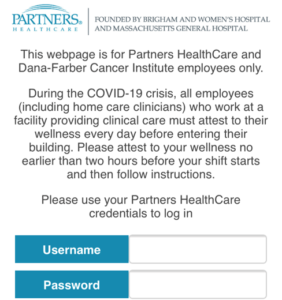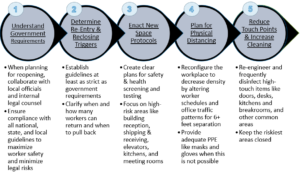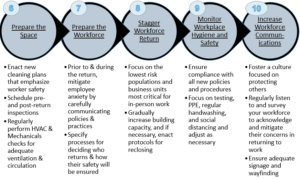This website uses cookies so that we can provide you with the best user experience possible. Cookie information is stored in your browser and performs functions such as recognising you when you return to our website and helping our team to understand which sections of the website you find most interesting and useful.
May 29, 2020
The Five Pillars of a Successful Return to Work Strategy
 The surgeon and public health researcher Atul Gawande works at the Mass General Brigham hospital in Boston, which is part of the Partners HealthCare system that has 75,000 employees across Massachusetts. Since his May 13th New Yorker article, Dr. Gawande has made the rounds on several talk shows popularizing Partners’ successful five pillar strategy to keep the virus under control and to maintain the safety of employees and patients. Although three quarters of all employees have remained working on-site, Partners has only had a few workplace transmissions of COVID-19.
The surgeon and public health researcher Atul Gawande works at the Mass General Brigham hospital in Boston, which is part of the Partners HealthCare system that has 75,000 employees across Massachusetts. Since his May 13th New Yorker article, Dr. Gawande has made the rounds on several talk shows popularizing Partners’ successful five pillar strategy to keep the virus under control and to maintain the safety of employees and patients. Although three quarters of all employees have remained working on-site, Partners has only had a few workplace transmissions of COVID-19.
Because Partners is unusual in that it has remained open throughout the pandemic and has had immense success in limiting transmission in one of the highest risk settings, it represents a good case study from which all industries can glean best practices. Businesses can learn from the combination of precautions that have worked at Partners to help change social norms and limit the number of workplace transmissions. SR Inc is particularly encouraged by the success of the first pillar – symptom screening of even the mildest symptoms – and is working with multiple Member-Clients to examine the development and adoption of relevant processes and tools across industries.
The five pillars include:
-

Partners HealthCare Symptom Screening App Screening – before entering the office, all employees and visitors should ensure they are not experiencing even the mildest symptoms: “Anytime I want to enter a hospital building, I have to… log in with my employee identification, and confirm that I have not developed a single sign of the disease—a new fever, cough, sore throat, shortness of breath, loss of taste or smell, or even just nasal congestion or a runny nose…A green pass on my phone indicates no symptoms and grants me access to the hospital. Otherwise, I can’t work [and it] directs me to call our occupational-health clinic and arrange for possible testing.” Similar apps have been developed by UnitedHealth Group & Microsoft and Appian and are used by countries like South Korea, Singapore, and Hong Kong. The U.S. CDC also stresses the importance of daily in person or virtual heath checks of employees before they enter the workplace in its latest guidance for employers.
- Hygiene – regular hand-washing and surface sanitation: “The key, it seems, is washing or sanitizing your hands every time you go into and out of a group environment, and every couple of hours while you’re in it, plus disinfecting high-touch surfaces at least daily.”
- Distancing – maintain a physical distance of at least six feet from others: “In my hospital system, observers gently remind us to stand the prescribed distance apart on escalators and in the elevator line…We’ve turned as many internal meetings, patient visits, and team huddles as possible into video meetings, even if someone is right across the hall. When we can’t avoid face-to-face encounters, we’ve put up Plexiglas barriers and spaced our chairs and workstations farther apart.”
- Masks – everybody that can should be wearing a cloth mask: “They provide ‘source control’—blocking the spread of respiratory droplets from a person with active, but perhaps unrecognized, infection.”
- Culture – it takes a shift in acceptable social norms to put the other four pillars into practice: “Culture is the fifth, and arguably the most difficult, pillar of a new combination therapy to stop the coronavirus…It’s about wanting, among other things, never to be the one to make someone else sick.”
Dr. Gawande finishes his New Yorker article stressing the difficulty of following the above combination of preventative measures: “It requires an attention to detail that simply staying in lockdown does not. But, during the crisis, people everywhere have shown an astonishing capacity to learn from others’ successes and failures and to rapidly change in response. There is still much more to learn…but answers will come only through commitment to abiding by new norms and measuring results, not through wishful thinking.”
Using Dr. Gawande’s New Yorker article, Cushman & Wakefield’s Recovery Readiness Guide for Reopening Your Workplace , JLL’s Guide to Returning to Work in the Next Normal, SR Inc created the following draft step-wise process for rebuilding the workplace. It is deliberately an elementary step-wise implementation process that we are glad to regularly customize and update for each Member-Client respecting the demands of their distinct industries, workplace functions, geographical regions, and existing internal policies and programs.
 As Manager of Research & Consulting at Sustainability Roundtable, Inc., Jeff Meltzer provides outsourced program assistance to clients on a one-to-one basis, helping real estate, operations, and sustainability executives set goals, drive progress, and report the results of their sustainability programs. Jeff holds a Master of Environmental Management from Duke University’s Nicholas School of the Environment and a B.A. in Environmental Policy from Colby College. He has relevant work experience with the Procurement and Property Services team at Citizens Bank as an EDF Climate Corps Fellow, with the EHS and Sustainability team at L’Oréal, and with the EPA Green Power Partnership as an Environmental Analyst at Eastern Research Group. He has client project experience with Biogen, helping the company develop a Scope 3 supplier engagement strategy to achieve its Science-Based Target. Jeff is also an active participant in sustainability groups, is an accredited LEED Green Associate, is trained in the GRI Standards and GHG Protocol, was the Co-President of Duke’s Net Impact club, and is an active member of the Net Impact Boston leadership team.
As Manager of Research & Consulting at Sustainability Roundtable, Inc., Jeff Meltzer provides outsourced program assistance to clients on a one-to-one basis, helping real estate, operations, and sustainability executives set goals, drive progress, and report the results of their sustainability programs. Jeff holds a Master of Environmental Management from Duke University’s Nicholas School of the Environment and a B.A. in Environmental Policy from Colby College. He has relevant work experience with the Procurement and Property Services team at Citizens Bank as an EDF Climate Corps Fellow, with the EHS and Sustainability team at L’Oréal, and with the EPA Green Power Partnership as an Environmental Analyst at Eastern Research Group. He has client project experience with Biogen, helping the company develop a Scope 3 supplier engagement strategy to achieve its Science-Based Target. Jeff is also an active participant in sustainability groups, is an accredited LEED Green Associate, is trained in the GRI Standards and GHG Protocol, was the Co-President of Duke’s Net Impact club, and is an active member of the Net Impact Boston leadership team.



